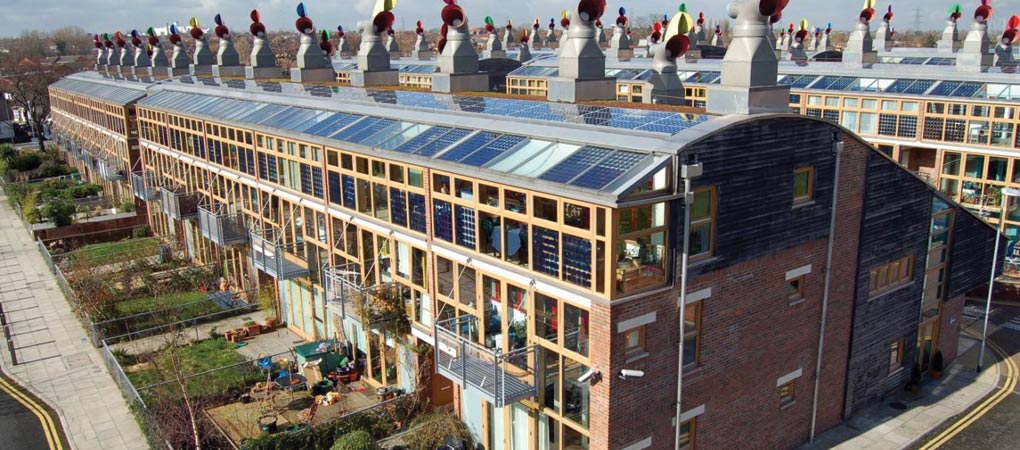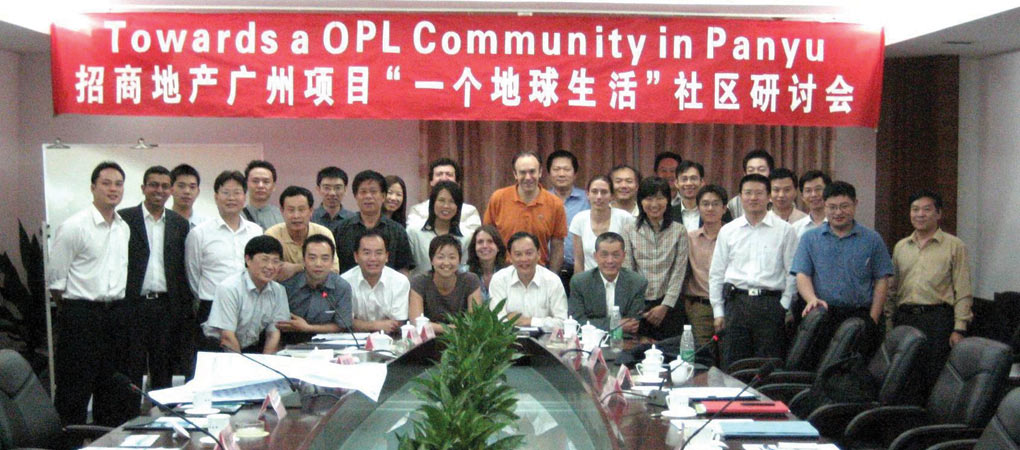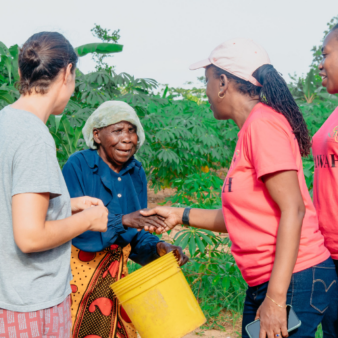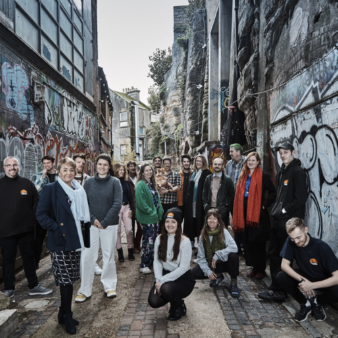One Planet Communities is a growing network of exemplary sustainable communities around the world, established by the BioRegional Development Group (BDG). Each project is financed by a private developer and/or social housing provider and BDG coordinates the programme, providing expert advice throughout the life of each project. With six developments either completed or in progress and over ten communities in the pipeline, BDG is creating sustainable neighbourhoods in Australia, Brazil, China, Canada, France, Luxembourg, Mexico, Portugal, UAE, UK, USA, South Africa and Tanzania. It is estimated that 130,000 residents and 500,000 workers and tenants will benefit directly from the programme over the next 15 years.
Project Description
Aims and Objectives
The project aims to demonstrate that sustainable living is possible, by creating a network of green neighbourhoods where it is easy, attractive and affordable for people to live a healthy, happy lifestyle within a fair share of the planet’s resources.
Context
Globally, the human population is consuming resources and polluting the planet at a much higher rate than the earth can renew or absorb. Ecological Footprint Analysis, a resource counting method that measures the amount of bio-productive land and sea on the planet, estimates that the average person uses 50 per cent more than the planet can sustain on the long term and that is without leaving space for wildlife and wilderness. If everyone in the world lived as an average UK resident, we would need three planets to support us. If we all lived like an average US citizen, we would need five planets to support us. Millions of people living in low-income countries live on less than a tenth of this. There is a shortage of inspirational examples of alternative ways in which people can live to ensure that the average ecological footprint is reduced.
Key Features
One Planet Communities is a growing network of exemplary sustainable communities around the world, established by the BioRegional Development Group (BDG), a social enterprise with charitable status which initiates practical sustainability solutions, and then delivers them by setting up new enterprises and partnerships around the world. With six developments either completed or in progress and over ten communities in the pipeline, BDG is creating sustainable neighbourhoods in Australia, Brazil, China, Canada, France, Luxembourg, Mexico, Portugal, UAE, UK, USA, South Africa and Tanzania.
One Planet Communities use BDG’s ten One Planet principles to address the environmental, social and economic issues that contribute to truly sustainable habitats. These principles are zero energy, zero waste, sustainable transport, water, materials and food, land use/wildlife, equity and economy, cultural heritage, and health and happiness. To date, 38,000 homes around the world, as well as offices, shops and hotels, have been designed in One Planet Communities, 11,000 of which are completed or in progress. It is anticipated that these communities will save up to one million tonnes of CO2 annually by 2020.
Completed projects include BedZED (completed in 2002 with 220 residents living in 100 houses and apartments and 2,500 m2 of commercial space) and One Brighton (a development of 172 apartments and community space in the UK, completed in 2009 and now fully occupied).
One Planet Communities in progress include:
- Sonoma Mountain Village – a US$1 billion redevelopment of an 81 hectare, ex industrial site in the USA where the Business Incubator is in use and the residential phase is expected to start in 2013, with completion by 2025.
- Jinshan – a mixed use community comprising 8,000 homes, a school, offices, live-work units, a business park, a community centre, leisure facilities, green spaces and wetlands, near Guangzhou in South China. To date, 350 homes are completed and occupied in Jinshan and three further phases are in progress.
- Masdar City – a six square kilometre zero-carbon, zero-waste and car-free community in Abu Dhabi. When completed, it will house approximately 50,000 people, up to 1,500 clean tech companies and the Masdar Institute of Science and Technology. The first phase of the Masdar Institute was completed in 2010 and the second phase is currently underway and expected to be completed by 2013; the entire development is estimated to be completed in 2020.
- Riverside One – 750 homes, a 120 bedroom hotel and over 40,000m2 of office and retail space in the UK, due for completion in 2018, subject to appropriate further investment.
Each One Planet Community has been through a process of public and stakeholder consultation as part of developing the One Planet Action Plan. Neighbourhood groups are involved from the inception through design to delivery of the schemes.
A free online One Planet toolkit can be downloaded from the website and BDG aims to inspire one million people globally to undertake one hour of induction (‘One Hour for One Planet’) and for 10,000 of these to go on to be One Planet Sustainability Integrators, applying the One Planet principles in their own communities.
What impact has it had?
- Residents undertake lifestyle changes needed to reduce their environmental impact, using less energy, car-sharing, growing or sourcing local food, recycling and reducing waste.
- Improved understanding and awareness of the principles of One Planet Living both within the One Planet Community and more widely.
- Businesses within each of the One Planet Communities are encouraged to promote fair-trade and local goods and to promote a positive impact on the broader environment.

How is it funded?
The One Planet Communities programme costs an average of US$590,000 annually to coordinate and enable research, knowledge transfer and experience sharing. It is funded through a combination of philanthropic and research grants (60 per cent), complemented by consultancy fees for services provided to partners and clients (40 per cent). Funders include Skoll Foundation, Ashden Trust and the Body Shop Foundation. The cost of each individual project is being financed by the private developer and/or the social housing provider.
The required US$3.9 million to deliver the 2011/12 BDG Business Plan has been raised. The main sources of income are fees for products or services including consultancy, training, sustainability integration, research and professional services to industry, commerce and government (average of 61 per cent of total income), grants and donations from government and charitable trusts and benefactors (average of 39 per cent of total income) and in-kind support from corporate and individual volunteers on a range of its project activities.
Why is it innovative?
- The approach is easy to understand and accessible, so that everyone can get on board. It has created a simple message and set of principles, with the aim of making it easy, attractive and affordable for people to lead happy and healthy lives within a fair share of the earth’s resources.
- The approach to sustainability planning is holistic and on a large scale, and can be adapted to suit many different contexts.
What is the environmental impact?
All of the One Planet Communities have a major focus on reducing energy and water consumption as part of their zero carbon strategy. Strategies employed include the use of renewable energies, passive solar design, rainwater collection, water efficient appliances, grey water recycling, reed beds and sustainable lifestyles (such as car-sharing, local food production etc.). A zero carbon strategy can be a combination of on and off site renewable energy. Each project has a zero waste strategy for construction and aims to achieve at least 98 per cent landfill waste diversion by 2020.
For example, the Sonoma Mountain Village has installed the largest private solar array in California to date to power all homes and businesses onsite; in Masdar, all ‘new’ water will be from indirect or direct recycled sources by 2020. Sonoma Mountain Village will provide green housing for 5,000 people and 77,000m2 of office, retail and commercial space as well as achieving an 82 per cent reduction in transport emissions, a 65 per cent local food consumption goal, and a 65 per cent reduction in use of municipal water. Jinshan is a mixed used development comprising 8,000 homes and a business park, which by incorporating office and commercial space for 200 businesses could result in 30 per cent less travel compared with neighbouring communities, reducing transport emissions by 3,200 tonnes of CO2 per year.
Wherever possible, reclaimed, recycled and local materials are used. For example, 98 tonnes of steel were reclaimed and reused at BedZED, saving 81,850 kg CO2 and costing no more than new steel; 53 per cent of construction materials are locally sourced, within a 30 mile radius of the site. The projects focus on maintaining and enhancing the existing on-site level of ‘ecosystem services’ and making a net positive contribution to local native biodiversity.
Is it financially sustainable?
One Planet Communities is able to keep costs down as BDG focuses on embedding knowledge into its partners’ teams and enabling knowledge transfer via online toolkits throughout the entire network, rather than only providing consultancy services to individual partners. The planned future funding requirement is US$783,039 per annum. BDG aims to secure up to 50 per cent of the funding from charitable and investment sources, with the balance coming from fee income, including subscriptions to knowledge sharing services.
All communities include business space for small, medium and social enterprises. For example, Sonoma Mountain Village includes a non-profit business incubator which has successfully leased out green office space to over 25 sustainability-orientated and socially relevant technology start-up companies that employ over 900 people.
When procuring materials and selecting contractors, local supply chains and tradesmen are engaged and given priority, as a means to support the development of an economy connected to the local environment and community.
Wherever possible, One Planet Communities include affordable housing. At BedZED, 25 per cent of all houses are affordable homes and 25 per cent are shared ownership. At One Brighton, out of 175 apartments 54 are social housing homes and 19 eco studios. In Australia and USA, residents will be living in an efficient environment that saves them around 50 per cent on utility bills, from reductions in the amount of hot water, heating and electricity needed.
What is the social impact?
A Community Interest Company or a Residents’ Association is formed to serve the benefit of the community and is used as a vehicle for community empowerment. A strong sense of community is often the residents’ favourite aspect of living in a One Planet Community. A variety of community wide activities are organised by members of the One Planet Communities, including farmers markets, craft days, recreational and cultural activities. More than half of the participants are from the local neighbourhood. The provision of affordable and market priced housing in the communities helps to ensure that households on all incomes are able to live and participate in the communities, and full disability access is provided in all One Planet Communities.
BedZED residents drive 64 per cent less than the national average and cycle more, with half of the residents owning a bike, and have greater interaction with their neighbours, leading to improved physical and mental health. Capacity-building workshops on One Planet Living are held for all those involved in the project including architects, engineers, construction workers, lawyers and marketing and sales personnel.
Barriers
- Many developers and social housing providers have preconceptions that green developments are very expensive. Detailed research evidence based on BDG’s practical experience of delivering cost-effective One Planet Communities convinces potential partners to find solutions, mechanisms and different financing models to reduce both costs and risks.
- Working internationally makes communications and delivery more challenging. BDG and the One Planet Communities programme have grown internationally in an organic way. BDG uses ICT to keep in touch and to keep costs and carbon emissions down.
- The global recession has had a big impact in slowing dramatically the pace and scope of BDG’s work to build new sustainable communities, especially in UK, USA and South Africa. BDG has continued to progress these projects, with a focus on creating sustainable local economies and on linking new build with retrofitting into existing communities.
Lessons Learned
- From BedZED, the prototype One Planet Community, the relative importance of lifestyles and infrastructure as well as green buildings and technology was identified.
- One Planet Communities are catalysts for wider initiatives such as the One Planet Region’s Sutton programme – a major initiative to promote more sustainable lifestyles among council residents and local business.
- It is important to pay close attention to contracts and make sure there are no loopholes.
Evaluation
BDG undertakes an annual review of progress with endorsed partners to ensure quality control, with each project benchmarked against a set of targets. These reviews are also about learning practical lessons for the future and are made publicly available.
Transfer
The One Planet Living framework is simple yet flexible and allows different communities to adopt the principles in their specific context. Currently the One Planet approach has been – or is in the process of being – replicated in 13 countries around the world. Sustainable communities to a value of approximately US$47 billion are in development using the approach.
An open source route to One Planet Living has been established through a set of on-line tools such as One Planet e-learning modules, ecological footprint calculator, One Planet Action Plan creator and online forums, so that as many people as possible can use the approach. BDG soft launched its open-source concept in January 2012 at the World Economic Forum at Davos, with a formal launch in June 2012 at Rio+20 with the goal of creating one million One Planet Champions globally and 10,000 One Planet Sustainability Integrators over the next three years.
The One Planet Communities approach is designed to encourage others to learn from the examples provided and set up similar approaches. Examples of transfer in the UK, where the first communities were established, can be seen in the Sutton area. As a result of building BedZED, the local authority has adopted the One Planet framework and started an initiative to promote more sustainable lifestyles, council services and local businesses within. Brighton and Middlesbrough councils are exploring similar opportunities. The eco-town movement has drawn heavily on BDG’s principles, with two developments ongoing.



